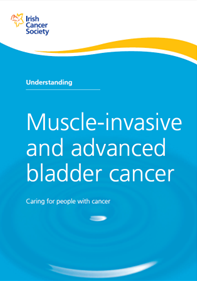TURBT surgery
TURBT is a procedure to remove tumours from the bladder.
About advanced bladder cancer
Bladder cancer that has spread to other nearby organs, such as the prostate, womb or vagina or to nearby lymph nodes is called locally advanced disease.
Bladder cancer that has spread beyond the surrounding areas, to other parts of your body such as the liver, bones or lungs is called advanced or metastatic bladder cancer.
Your cancer may be in more than one part of your body when it is first diagnosed.
Treatment for advanced bladder cancer
If your cancer has spread it can still be treated. Treatment is usually to try to control the cancer rather than to cure it. You may also have treatment to improve any symptoms you have.
There are a range of treatment options for metastatic bladder cancer and new treatments are being developed all the time.
Often metastatic cancer is treated with chemotherapy or other cancer drugs. There may also be treatments that you can have as part of a clinical trial.
Treatment options for advanced bladder cancer
Chemotherapy for advanced bladder cancer can often slow its growth and keep it under control for some time. Examples of drugs used for advanced bladder cancer include gemcitabine and cisplatin. Chemotherapy can cause side-effects, so your doctor may advise less intensive chemotherapy or a different treatment, depending on your age and general health.
Read more about chemotherapy.
Immunotherapy drugs encourage the immune system to recognise and help destroy cancer cells. A new group of drugs called checkpoint inhibitors can be used when the cancer is locally advanced or advanced. For example, pembrolizumab and atezolizimub. Your oncologist will advise you if they think
immunotherapy drugs are suitable for you.
Clinical trials are testing whether combining newer checkpoint immunotherapy drugs with chemotherapy and radiation therapy will benefit people with bladder cancer. You can ask your consultant if there are any clinical trials suitable for you.
Surgery for advanced bladder cancer is usually to improve symptoms.
TURBT surgery
You may have a TURBT procedure to remove as much cancer as possible from your bladder. This is to stop any bleeding and relieve pressure in your bladder from the cancer, which can make it hard to pee. It may also slow the spread of the cancer.
With TURBT, a tube called a cytoscope is put into your bladder through your urethra. Instruments are put through the cytoscope to cut or burn off tumours.
Surgery to unblock your kidneys or your ureters
Sometimes the cancer can block your ureters (tubes that connect your kidneys to your bladder) or kidneys. If this happens, urine (pee), can build up in the kidneys and stop them from working properly. There are 2 ways doctors can help with blockages:
- Stents: The doctor puts a small tube called a stent into the ureter, to keep it open, so that the urine can flow properly. The stent is put in through your urethra – the tube that brings urine out of your body.
- Nephrostomy tube: The doctor puts a tube through your skin. The urine passes through the tube into a bag on the outside of your body.
Radiotherapy can control advanced bladder cancer and help with symptoms, such as bleeding in your bladder or bone pain.
Radiotherapy given to improve symptoms and help you to feel better is sometimes called palliative radiotherapy. Often with palliative radiotherapy you will have a single dose or a short course of treatments.
Any side-effects affect the part of the body that is treated. With a short course of radiotherapy, you may not have any side-effects or side-effects may be less severe than with a longer course.
Palliative care helps you to manage your symptoms and improve your quality of life. Palliative care includes end-of-life care, but your doctor may also recommend palliative care to manage symptoms and complications earlier in your illness.
The palliative care team can include specially trained doctors, nurses, social workers, physiotherapists, occupational therapists, complementary therapists, chaplains and counsellors.
Palliative care can be arranged by your family doctor (GP), public health nurse or by the hospital. Palliative care is a free service for all patients with advanced cancer.
Living with metastatic / advanced cancer
If you have a metastatic cancer diagnosis, we have information and support to help you.
Medical content updated from our Understanding muscle-invasive and advanced bladder cancer booklet (2023), reviewed by Catherine Dowling, Consultant Urological Surgeon, Robert McConkey, RANP Urology (bladder cancer), Anne Daniels, ANP Urology, Lynn Casey ANP Urology, Catherine McGarvey cANP Urology, Aoife McDonnell cANP Urology, Karen Fitzmaurice, Daffodil Centre Nurse.
Related links
Talk to a Cancer Nurse
Our Daffodil Centres



